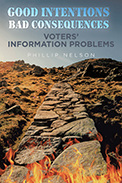
 |
The author has published this book as a new approach to understanding voter choice. Nelson’s impressive economic credentials give weight to his argument that more information about bad consequences could have changed the results of recent elections. He predicts that in the future such information can sway the votes of conservatives, liberals, altruists (liberal and naïve), and even Republicans and Democrats.
The book starts with explaining the good intentions that have caused a clash among voters. Those who exercise their rights at the polls often share similar altruistic motives. Most people want to help the less fortunate. Many believe it will take a redistribution of wealth. Altruists want to improve the world but cannot define just what that entails. Conservatives want to stop foreign trade agreements. As a result of altruistic ideals, bad consequences to economics are being ignored. Where will the wealth that is to be distributed come from? How will non-trade impact the economic status of a modern government? Which voter groups will suffer real loss?
The author helpfully defines some of the phrases swirling around today that can confuse conscientious citizens of a representative democracy. Shouldn’t we know the meaning of "reciprocity partner," "confirmation bias," "xenophobia," or "the disincentive effect"? Can we spot real differences between liberal altruism and charitable giving? We will after reading his 164-page, authoritative book. Nelson’s target audience is his social scientist peers and concerned citizens. These readers can glean information from the written word, but the technically-inclined voter would rather see survey percentages delivered in comparative graphs. The included index is useful, but a table organizing opinions/standards held by various voter types would have been a nice addition. With the significant potential that good intentions impacting voter dynamics could undermine a representative democracy, Nelson’s book is a must-read!
RECOMMENDED by the US Review.